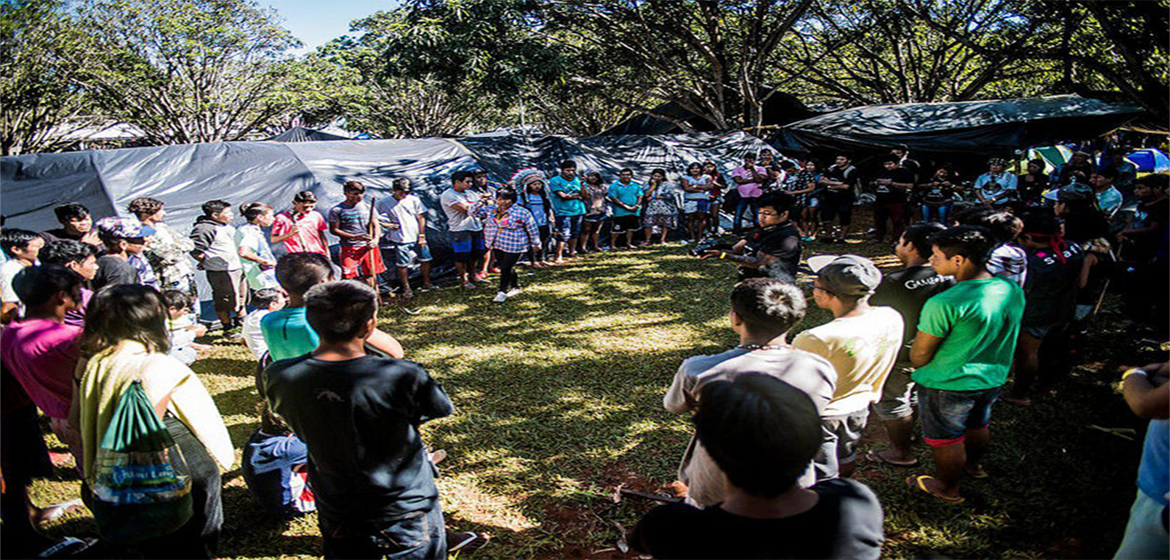By Lindsay Bigda, RRI
“For those who do not know the history of the Acampamento Terra Livre, we began with very little structure… After 14 years, we now have the largest Indigenous Peoples’ mobilization in Brazil,” an indigenous community member said at this year’s mobilization in April. “Throughout these years, we raised our sons and daughters to continue this fight to protect our indigenous homelands.”
The 15th Free Land Camp (Terra Livre, or ATL for its Portuguese acronym) brought 3,000 Indigenous Peoples and their allies together from all regions of the country at a massive encampment in Brasilia to call for justice for indigenous communities. Participants used the gathering—one of the largest ever—to create and present a unified political agenda before the Brazilian government.
Indigenous women had at this year’s encampment, organizing the opening ceremony and playing a greater role in the elaboration of indigenous policies.
“Many people ask themselves: Where are the women, they do not participate? Why don’t women have a voice?” said longtime indigenous rights advocate , who attended ATL. “But if you stop and think, where are the women? In the communities, on the ground, taking care of the family, being the provider of culture, the provider of the language and food sovereignty, the provider of social organization and the educational process. I mean, who is the woman? The woman is everything!”
The encampment also served as a protest to what many consider an unprecedented and increasingly hostile attack by the administration of President Michel Temer on indigenous rights, in favor of the country’s rural and agribusiness elite.
According to , Brazil is rated the most dangerous country in the world for social and environmental activists—a record that has only worsened under the Temer government and a Congress dominated by the rural caucus (agribusiness lobby). Although the country has recognized nearly of land as community-owned, these gains as well as untitled lands are at risk from development, infrastructure, and agribusiness projects.
The final document prepared during the ATL states: “The original rights over our lands, guaranteed by Article 231 of the Constitution, have been systematically violated by the executive, legislative, and judiciary powers, not only by the complete paralysis of the demarcations of indigenous lands but also by the review and rollback of the recognition of our territorial rights.”
More specifically, indigenous communities raised concerns over a series of government actions that are threatening their lives and livelihoods, including:
- A failure to demarcate indigenous lands as guaranteed under Brazil’s 1988 Constitution and, in certain cases, the cancellation of already established demarcations. The Munduruku community also held a specific protest against a decades-long government delay in the demarcation of their Sawre Muybu territory and the imposition of a dam on their lands.
- An unprecedented number of anti-indigenous bills moving through the Senate, as well as Constitutional Amendment 95—which effectively freezes federal spending for 20 years, including resources earmarked for indigenous communities.
- Infrastructure projects that are moving forward without the consultation or consent of indigenous communities who would be affected by them.
- A recent decision by Justice Minister Torquato Jardim to appoint Wallace Moreira Bastos—a businessman who has no experience with indigenous affairs—as the new president of FUNAI, the government agency in charge of indigenous issues. In recent years, the agency has also seen massive budget cuts.
In the context of increased violence and criminalization of indigenous leaders, encampment participants are calling for the state to take concrete actions to correct these injustices, including the demarcation and protection of all indigenous lands, the institutional strengthening of FUNAI, increased investment in health and education serves, and the rejection of legislative initiatives that attack Indigenous Peoples and run contrary to international treaties signed by Brazil, among others.
Leaders from Brazil’s Indigenous People Articulation (APIB)—noting the presence of international delegations for the first time—are also the international community to help hold the Brazilian government accountable for respecting Indigenous Peoples’ rights.
Source:
Related to SDG 10: Reduced inequalities and SDG 16: Peace, justice and strong institutions



